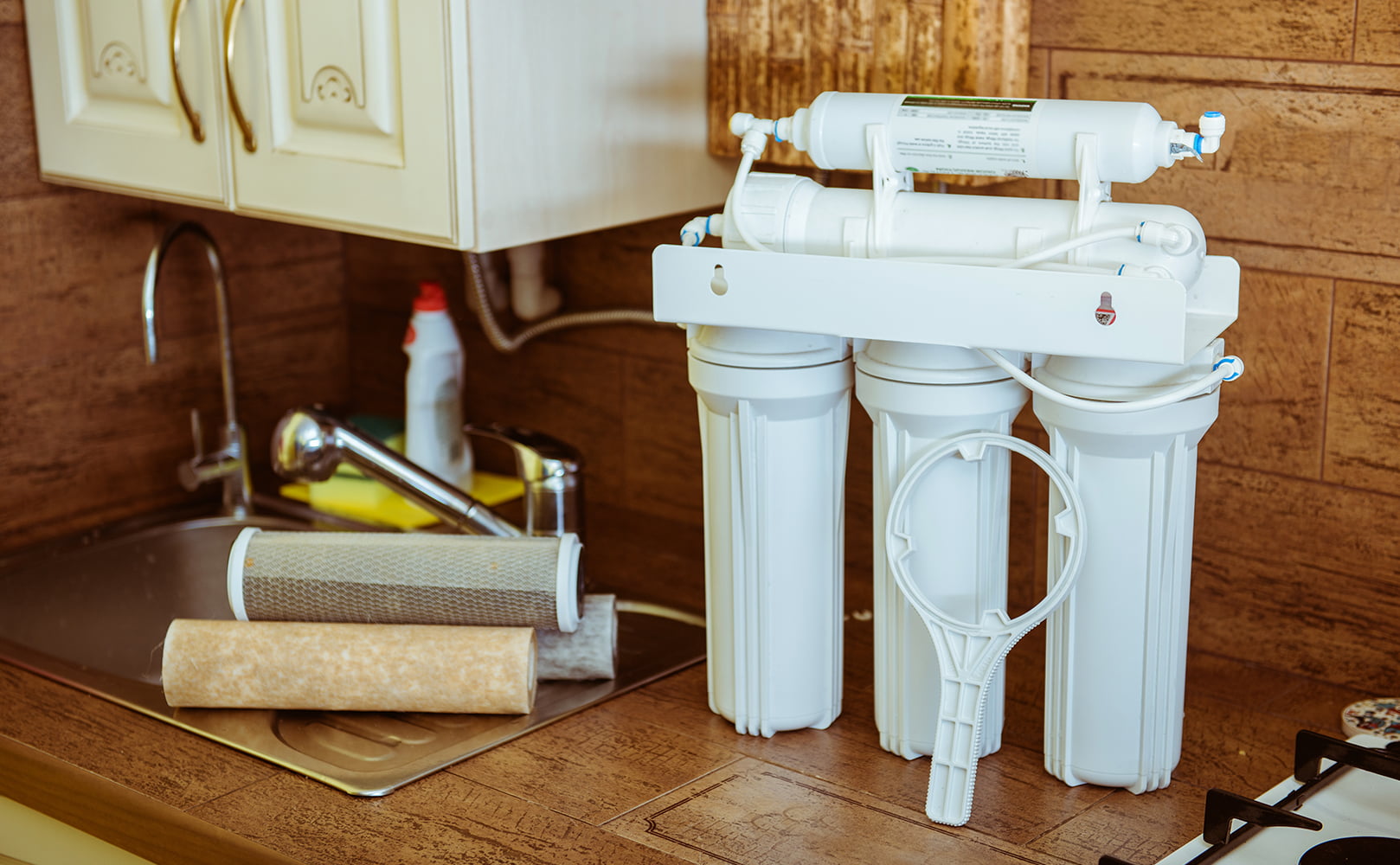Water Filtration vs. Softener – What’s the Difference and Which to Use When?
Written by: Gene Fitzgerald // Last Updated: Oct 11, 2022
This page may contain affiliate links. If you buy a product or service through such a link we earn a commission at no extra cost to you. Learn more.
Some people falsely believe that, apart from producing soft water, their water softener would also protect them from harmful contaminants. Truth is, it has virtually zero effect on water quality in terms of purity.
Others are convinced that a water filter makes a great choice for treating hard water issues. Wrong again.
As there seems to be a lot of confusion about when to use a water softener and when a water filter, we are going to point out the difference between the two, and explain under what circumstances one is to be favored over the other.
Key Takeaways
- Have your water tested.
- If it contains high levels of calcium and other minerals, you are dealing with hardness and should get a softening system.
- Water softeners prevent the build-up of limescale in your plumbing and household appliances, preventing premature wear out and helps to lower maintenance and repair costs.
- If your water has an unpleasant taste and odor to it, or if you face potentially harmful contaminants that better be removed, a water filter is needed.
- Water filters are effective at removing contaminants or impurities such as lead, chromium 6, and pesticides. They are ideal if your primary concern is to use your water for drinking.
Water Softeners vs. Water Filters – What’s the Difference?
Does a Water Softener Also Filter Water?
Hard water does not pose a health risk. Quite the contrary, its high mineral content is healthy for our bodies. This is why with water softening, the overarching goal is NOT to remove certain contaminants.
Rather, the purpose of a softening unit is primarily to prevent the build-up of limescale in your plumbing system and household appliances to protect them from premature wear out.
This can be achieved by either
- completely removing calcium, magnesium and possibly other hardness ions with the help of a genuine salt-based water softener that accommodates a resin bed.
- Or simply by altering the ions’ behavior to reduce their affinity to stick to surfaces, e.g. by using citric acid as a chelation agent.
The latter is also called “water conditioning“. It has the advantage that no sodium is added to your water.
Both methods will increase the lifespan and efficiency of pipes, water heaters, dishwashers, washing machines, etc. while lowering maintenance and repair costs. However, time has shown that the former is far more effective and thus the go-to approach.
Want to learn more about how a water softener works?
Also, water softeners are point-of-entry systems, meaning that they connect to the main line and soften all water in your entire home.
To answer our opening question, yes, a softener does filter water. However, “all” that is removed are hard water ions. Softeners were not designed to make water potable by filtering microorganisms, heavy metals, chlorine and other chemicals, fluoride – you name it.
| Contaminant | Removal – Yes/No? |
|---|---|
| Sediment | Partially, but will cause damage to system |
| Hardness | Yes |
| Taste & odor | No |
| Chlorine | No |
| Chemicals | No |
| Fluoride | No |
| Lead | No |
| Waterborne pathogens | No |
| Iron/rust | Partially, but will cause damage to system |
Do Water Filters Also Soften Hard Water?
Will a water filter also remove hard water minerals and therefore soften your water? Not really, at least not effectively and/or efficiently enough.
However, if you are concerned about certain contaminants or impurities such as lead, mercury or pesticides for health reasons, or you simply want to improve water aesthetics, a filtration system is the right choice.
The group of water filters includes reverse osmosis (RO) systems, activated carbon (most common) and other media-type filters, and microporous filters among others.
Depending on which type you choose, contaminants get trapped in a filter e.g. by adsorption, ion exchange or micron filtration and later removed via backwashing or cartridge replacement. Or they are flushed down the drain right away.
Whereas water softeners need to be plumbed in, the majority of filters are point-of-use devices that e.g. install under a kitchen sink or attach to a faucet. This means that they provide filtered water at a single outlet only which is why they are much smaller and less costly. (Of course there are also whole house purifiers.)
Bottom line: Especially if you use your water for drinking you should consider adding a filter system to your home. It will provide great-tasting water and protect the health of your family.
Every water softener is a water filter, but not every water filter is a water softener.
| Contaminant | Removal – Yes/No? (+ Preferred Methods) |
|---|---|
| Sediment | Yes |
| Hardness | Partially, but will clog filters |
| Taste & odor | Yes (carbon media) |
| Chlorine | Yes (carbon media) |
| Chemicals | Yes (carbon media) |
| Fluoride | Yes (RO or activated alumina) |
| Lead | Yes (RO or activated carbon) |
| Waterborne pathogens | Yes (RO) |
| Iron/rust | Yes |
Testing Provides Answers
Water softener vs water filter – the decision as we now know depends on the condition of your water:
- On the one hand, if it contains high levels of calcium and other minerals you are obviously dealing with hardness. A softening system is required.
- On the other hand, if it has an unpleasant taste and odor to it, or if you face potentially harmful contaminants that better be removed, a specialized filter is needed.
Generally speaking, a water softener protects your possessions, a water filter protects your health.
Now, to identify a hardness problem you could look for marks that hard water leaves in your home. These include stains on sinks, tubs, glasses and cutlery, scale deposits in pipes, and flaky skin and brittle hair that your family is struggling with.
In addition, excessive chlorine can easily be spotted due to its characteristic taste and smell.
However, dozens of partly dangerous contaminants that could be present in your water right now cannot be perceived with your eyes, nose or mouth. What’s more, in order for a water softener to work efficiently you need to know the exact mineral composition and concentrations.
That’s why thorough testing is the name of the game. Luckily, you don’t have to commission these tests yourself. Somebody already did that for you – for free!
Because every utility in the United States has to annually provide a quality report listing all contaminants that were found in their water the previous year. All you have to do now is find out where you receive your water from and request a copy of the latest report (not possible if you are on a private well).
Alternatively, you can have your water tested at a certified laboratory or invite a local treatment company to your home. Talking to an expert has the benefit that you can pick his brain about particular water issues. Just don’t let him talk you into buying something that you don’t want or need.
Your last option would be to pick up a kit and do the testing yourself. But this is only really recommended to measure calcium levels for hardness. DIY-testing for a broad range of contaminants lacks precision and is not economic.
Do You Need a Softener If You Have a Whole House Filter and Vice Versa?
If you struggle not only with hard water but also impurities that you want to get rid of, then the answer is yes.
The right whole house filter system supplies water safe for consumption including showering, but only reduces hardness to some extent which is not sufficient to rule out scaling.
A softener takes care of the hardness but does not supply water that meets drinking water standards.
- The Benefits, Pros and Cons of Water Softeners – Do You Need One?
- You need a new whole house water filter? Read our reviews here.
- You are looking for a softening unit to solve your hard water problems? Find the best water softeners here.
- Water Filter Before or After Water Softener
- Will a Whole House Water Filter Remove Calcium?
So if you have the money, why not use a water softener and filter combo? In fact, this is pretty common among home owners.
By the way, this is usually also our recommended order of setup:
- First you have a softener that removes hardness.
- Then you have for example a reverse osmosis system that eliminates up to 99 percent off all impurities including the sodium that was added during the softening process. This will make your water ready for drinking.
By pre-softening the water you will also protect the delicate RO membrane at the heart of the system from fouling. The same applies to filter cartridges that contain carbon or other filter media.
Above that, adding a pre-filter before the softener is a great way to trap sediment that would otherwise accumulate in the softening system.
All in all, using both a water softener as well as a water filter is a win-win for sure!
If you have any questions about water softeners vs. water filters please don’t hesitate to leave a comment below!
Information provided on BOS is for educational purposes only. The products and services we review may not be right for your individual circumstances.
We adhere to strict editorial guidelines. Rest assured, the opinions expressed have not been provided, reviewed, or otherwise endorsed by our partners – they are unbiased, independent, and the author’s alone. Our licensed experts fact-check all content for accuracy. It is accurate as of the date posted and to the best of our knowledge.




